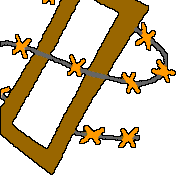
Home | Site Map | Internal | Public Resources | Hosted Groups
 |
Funds for Freedom
Home | Site Map | Internal | Public Resources | Hosted Groups |
 |
VI. FOUNDATION GRANTS 1. For best results, do your research thoroughly, keep good records, and plan multiple applications over several years. 2. Write clear, well-planned proposals; give special attention to your budget. 3. Combine foundation requests with other fundraising plans and ask for matching grants. 4. Consult AIUSAís foundation program before applying to any national foundations. Families, corporations, and organizations of all kinds create foundations to give away money. (What a great ideal) U.S. law requires them to give away 5% of their assets every year. AIUSA has a very successful grant-seeking program, supervised by Alice Hunsberger in New York; but hundreds of community-based foundations are out of AIUSAís reach because they give only to local groups. With research and patience, your group can make money from these sources. Plan ahead. It can take a year or more between proposal development and receipt of a grant. Never count on the money unless and until it arrives.
Your first task is to locate foundations in your area and study their goals and giving patterns carefully. If you spend hours applying to a foundation which only gives athletic scholarships, youíll waste time and get discouraged. To conduct research: 1. Find a local foundation library (a list appears in "Resources"). 2. Find a group member or supporter who sits on a foundation board or writes applications for another non-profit. Ask advice about the local foundation scene. 3. Donít be afraid to call Development Directors of local non-profits for advice. Most will share what they know about the ins and outs and eccentricities of foundations theyíve worked with. They may also know a foundation which wonít fund their work but might fund yours. 4. Pay close attention to the funding sources of other charitiesí programs and projects. You may discover small or new foundations which donít appear in standard directories. 5. After locating the likeliest possibilities, call these foundations to get a copy of their guidelines. After reading them thoroughly, call and speak to a program officer. Ask that person any questions you have; be prepared to explain how your groupís work fits into the foundationís stated priorities. Ask if theyíd be willing to review a proposal from you. If so, theyíll advise you on format and structure.
First, go back and look at the information on direct requests in Section II; the same basic rules apply. In addition: Ask the foundation to fund a unit of your work which addresses their specific goals. Some foundations never give grants for "general operating support"; others do, but need to see the connection between your goals and theirs. An education foundation might support your human rights program in local schools. Other foundations might show interest in leadership development, educating youth of color, organizing religious groups, or involving seniors.Keep the language straightforward and clear. Describe the problem you address; if other groups work on the same problem, state why your group is different (they focus on pre-school and you focus on teenagers) or innovative (experience, knowledge, training, size, track record). Develop a clear, thorough, realistic, and generous budget. Include supplies and overhead costs such as telephone calls, bus and car fares, and photocopies, even if you think some volunteers wonít ask for reimbursement of these costs. Bear in mind that foundation program officers evaluate hundreds of programs and budgets each year and are VERY adept at recognizing when a budget indicates that a group knows what itís doing, and when its numbers are pulled out of thin air. Many program officers look at the budget first and consider it the most important part of a proposal. So you must research your costs and list them clearly. Donít expect the foundation to fund your project 100 percent. They rarely want to be your sole supporter; it leaves them feeling like the only diner in a restaurant (Why isnít anybody else here? Is there something I donít know?) Matching grants are very compelling: you outline your plan to raise $500 for a $1000 project and ask them to contribute the other half. In these cases, success breeds success: your case is stronger if you raised $500 last year, or even better, each year for the past five. As a rule, one grant application wonít get you far. You need to develop an organized program, submit many proposals, and expect many rejections. Keep a file on each foundation, adding notes after every conversation you have with a foundation representative. (You may think youíll remember, but what if some other volunteer makes the application next year?) Keep notes on which program officers were most sympathetic and who was a pain in the neck. If rejected, find out why, and note this in the file. If you were turned down because your work absolutely does not fit their guidelines, look elsewhere. Otherwise, reapply as soon as the foundation allows. Statistics show that organizations often need a track record of two or three applications before they are considered and finally funded.
Congratulations! Treat the foundation as you would any major donor (see Section II)--thank them early and often and keep them informed about your activities. Add to this a special letter explaining how you used the money and thanking them once again. Ask again--they have made an investment in your work. To get started, see "Resources" for a list of foundation libraries. |
 |